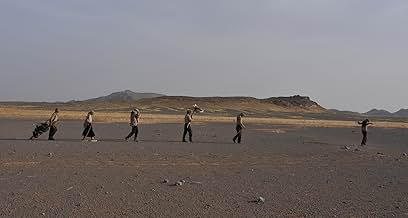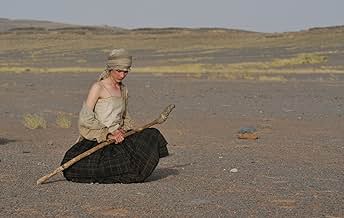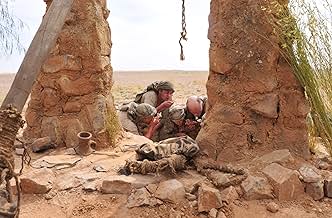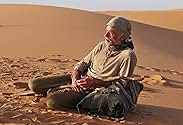- Nominated for 1 Oscar
- 4 wins & 5 nominations total
Gustaf Skarsgård
- Voss
- (as Gustaf Skarsgard)
Zachary Baharov
- Interrogator
- (as Zahari Baharov)
Sally Brunski
- Janusz's Wife, 1939
- (as Sally Edwards)
Dejan Angelov
- Andrei
- (as Deyan Angelov)
Mariy Rosen
- Lazar
- (as Marii Grigorov)
Nikolay Stanoev
- Yuri
- (as Nikolai Stanoev)
- Director
- Writers
- All cast & crew
- Production, box office & more at IMDbPro
Featured reviews
This is a wonderful film that is completely unpretentious, has no explosions, maltreated corpses or dramatic emotional outbursts, but a stringent and focused narrative, good camera work and above all great actors, all together as an ensemble. And even though we know that Ed Harris and Colin Farrell are always worth their money, especially Farrell as a Russian criminal is an absolute highlight. How he goes from being brutal, then self-doubting to a social being is very well directed by Peter Weir, but played by Farrell in a truly stunning way. Halfway through the film, a fresh, new color comes into play with Saoirse Ronan. Weir builds up the story well, maybe the hike through the Himalayas is a little too short, but at that point we already understood what drives the small troop of survivalists. A true gem.
90U
I think it's always difficult to portray hardship and endurance in films purely because you only experience it for a couple of hours or so. This had me understanding the terrible conditions for real....i think. The search for water in the Gobi desert had me thinking twice about attempting the same thing as a holiday. Make up was fantastic and the bleakness of the scenery was soo beautiful
This is a film for people who appreciate epic landscapes and survivor stories. It has some engaging characters but not brilliant dialogue or complicated characters. Mostly, it is a visual film, displaying the vulnerability of a few people in a harsh, vast, beautiful landscape. They must depend on each other, and they develop an intimacy based on their shared struggle rather than on deep conversations and emotional revelations, or at least, not until a young girl joins them. Weir seems to be commenting on the yin yang of masculinity/femininity at times in this film. I also liked the subtle underlying commentary on the brutal oppression of the Soviet regime under Stalin.
All of the actors were good; Farrell adds a touch of humor, Sturgess portrays anguish well, and Harris is a good tough old guy--his usual persona. By the way, Manohla Dargis in The New York Times complains that Farrell is too good-looking to be a Russian gangster. What this assessment is based on I can't imagine; doubt Dargis hangs with Russian gangsters.
All of the actors were good; Farrell adds a touch of humor, Sturgess portrays anguish well, and Harris is a good tough old guy--his usual persona. By the way, Manohla Dargis in The New York Times complains that Farrell is too good-looking to be a Russian gangster. What this assessment is based on I can't imagine; doubt Dargis hangs with Russian gangsters.
The story of a small group of people escaping from a Siberian Soviet prison, part of the "Gulag" in wartime and walking 4000 miles to freedom looked a trifle grim in the trailer, but Peter Weir has managed to produce a rather beautiful film out of it, using Bulgaria and Morocco as locales rather than Siberia and the Gobi desert. Only Darjeeling in India plays itself. My only trouble with it is the rather uneven character development. The story lends itself to ensemble playing but we learn little about two or three of the walkers. In the case of the lead character Janusz (Jim Sturgess) who is the source of the story this is explicable as we are seeing the others though his eyes, but it has to be said that both "Mr Smith" (the excellent Ed Harris) and the Girl (Saiorse Ronan) leave a lasting impression.
I know there is some doubt as to the authenticity of the story, taken from a 1955 book by Slavimir Rawicz a former Polish army officer, and indeed what the group are supposed to have done looks impossible but that's not a problem, because the relationships ring true. It is remarkable how an almost random collection of individuals, including one with a very unsavoury past, can, driven by sheer necessity, wind up functioning as a team. Partly this is due to the leader actually having some navigational knowledge and therefore inspiring confidence in the others. Mr Smith remarks early on that the Janusz has a serious weakness; he is kind, but when the chips are down we see that even the hard-bitten Mr Smith is capable of compassion.
Strangely enough, after the initial scenes in the prison camp, and the escape, there is not a lot of drama. The group encounter very few people on their travels and those they do meet take little interest in them (perhaps they had not heard about the bounty for escapees). Obtaining food and water is obviously a big issue, so mind out for the messy hunting scenes. I was astounded at how well their footwear stood up to the punishment; my hiking boots are not good for 400 miles let alone 4000. Actually they must have wandered around a bit - the northern end of Lake Baikal and Lhasa in Tibet are about 1800 miles apart, though the prison camp was somewhere north of the lake. It's also not clear how long the walk took, but at times it seemed like years. Weir's great achievement is to keep us watching a very drawn out tale. Personally I think I would have died of boredom if I had been in this particular walk, if starvation hadn't got me first.
I know there is some doubt as to the authenticity of the story, taken from a 1955 book by Slavimir Rawicz a former Polish army officer, and indeed what the group are supposed to have done looks impossible but that's not a problem, because the relationships ring true. It is remarkable how an almost random collection of individuals, including one with a very unsavoury past, can, driven by sheer necessity, wind up functioning as a team. Partly this is due to the leader actually having some navigational knowledge and therefore inspiring confidence in the others. Mr Smith remarks early on that the Janusz has a serious weakness; he is kind, but when the chips are down we see that even the hard-bitten Mr Smith is capable of compassion.
Strangely enough, after the initial scenes in the prison camp, and the escape, there is not a lot of drama. The group encounter very few people on their travels and those they do meet take little interest in them (perhaps they had not heard about the bounty for escapees). Obtaining food and water is obviously a big issue, so mind out for the messy hunting scenes. I was astounded at how well their footwear stood up to the punishment; my hiking boots are not good for 400 miles let alone 4000. Actually they must have wandered around a bit - the northern end of Lake Baikal and Lhasa in Tibet are about 1800 miles apart, though the prison camp was somewhere north of the lake. It's also not clear how long the walk took, but at times it seemed like years. Weir's great achievement is to keep us watching a very drawn out tale. Personally I think I would have died of boredom if I had been in this particular walk, if starvation hadn't got me first.
Peter Weir's first film in seven years is another exercise in sturdy direction with strong social themes running through it - recalling many of his previous works in style and content. It follows a group of escaped prisoners from a Siberian gulag in 1940 as they brave the treacherous wilderness of Asia for freedom from the Soviet regime. It's tough viewing for the most part but there is a surprising amount of comic relief along the way, provided chiefly by Colin Farrell's salty character. The group scavenge for food, even fighting off wolves for the carcass of an animal at one point - but the constant bickering and relentless doom and gloom does begin to wear. The film picks up however once Saoirse Ronan enters the picture and her youthful feminine presence brings an interesting dynamic. Emoting with a flawless Polish accent (almost like a mini-Streep) her character is one of the more compelling and layered and gives this emerging young actress a chance to display her skills. The cinematography is serviceable but hardly spectacular - capturing a harsh, arid landscape as opposed to Malick-like celebration of nature.
As the film wears on, the struggle to survive intensifies, particular when they reach the Ghobi desert - the scenes are very well done but viewing becomes quite grueling. Harris bring a certain integrity to his role in a rather unshowy performance with not much character introspection (I can see why his Oscar buzz has disappeared). In fact character development across the board is quite lacking, and watching the plot unfold, with the knowledge of the outcome of the story already provided in the opening titles - the narrative becomes quite arbitrary and the story doesn't always sustain interest. The final leg of the journey through the Himalayas almost seems rushed compared to the bloated second act. Still, it's a very well-made film with good acting and visuals - just don't expect to be inspired.
As the film wears on, the struggle to survive intensifies, particular when they reach the Ghobi desert - the scenes are very well done but viewing becomes quite grueling. Harris bring a certain integrity to his role in a rather unshowy performance with not much character introspection (I can see why his Oscar buzz has disappeared). In fact character development across the board is quite lacking, and watching the plot unfold, with the knowledge of the outcome of the story already provided in the opening titles - the narrative becomes quite arbitrary and the story doesn't always sustain interest. The final leg of the journey through the Himalayas almost seems rushed compared to the bloated second act. Still, it's a very well-made film with good acting and visuals - just don't expect to be inspired.
Did you know
- TriviaThis movie was inspired by the memoir of Slavomir Rawicz depicting his escape from a Siberian gulag and subsequent four thousand-mile walk to freedom in India. Incredibly popular, it sold over five hundred thousand copies, and is credited with inspiring many explorers. However, in 2006, the BBC unearthed records (including some written by Rawicz) that showed he had been released by the U.S.S.R. in 1942. In 2009, another former Polish soldier, Witold Glinski, claimed that the book was really an account of his own escape. However, this claim too has been seriously challenged.
- GoofsJanusz demonstrates a method using shadows of a stick and rock to find the compass direction of south. Yet, many of the scenes show them walking in a direction inconsistent with sun angles i.e. sun at their backs, which would have them walking north.
- ConnectionsFeatured in Breakfast: Episode dated 7 December 2010 (2010)
Details
- Release date
- Countries of origin
- Languages
- Also known as
- Camino a la libertad
- Filming locations
- Production companies
- See more company credits at IMDbPro
Box office
- Budget
- $30,000,000 (estimated)
- Gross US & Canada
- $2,701,859
- Opening weekend US & Canada
- $1,218,868
- Jan 23, 2011
- Gross worldwide
- $24,172,201
- Runtime2 hours 13 minutes
- Color
- Sound mix
- Aspect ratio
- 2.35 : 1
Contribute to this page
Suggest an edit or add missing content




































